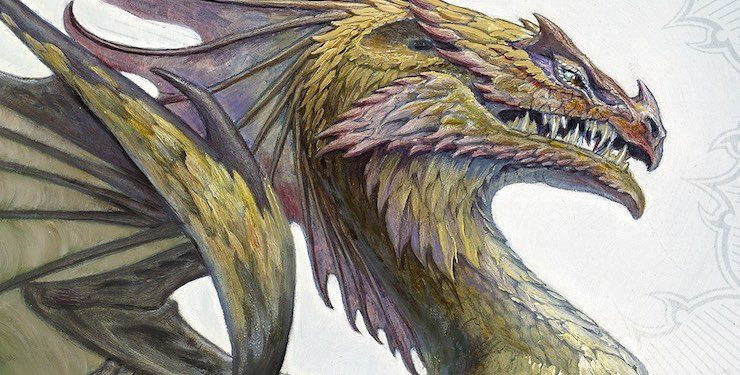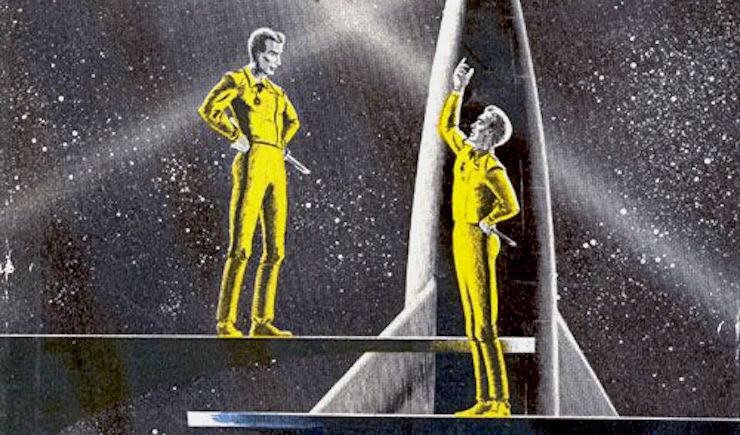Well, whaddaya know. It’s a Wheel of Time Re-read post! We hardly ever have one of those!
Today’s post covers Chapters 3-4 of Lord of Chaos, which my then-six-year-old cousin once looked at the cover of and pronounced “Load of Choss,” which led to an extremely giggle-filled dialogue among my sisters and I as to what exactly “choss” might be, and how a load of it might be employed. Most of our suggestions, needless to say, were not terribly FCC-compliant.
Anyway. Previous entries are here, and as always, all posts can, have been, and will be filled with spoilers for all currently published novels in the Wheel of Time series.
So There.
 Chapter 3: A Woman’s Eyes
Chapter 3: A Woman’s Eyes
What Happens
Rand seizes saidin and forms what he thinks of as a hole in the Pattern, something he had learned on his own. He tells Taim, who is staring at him, that this is a gateway, and he’ll teach it to Taim if he didn’t catch it the first time. The Maidens dart through first, then Rand and Taim follow; Rand hears Aviendha calling to him to wait from the Palace side and quickly lets the gateway collapse before she reaches them. The others all look at him, Taim curiously and the Maidens with disapproval, but Rand ignores them and sets off through the trees. As they walk, Rand tells Taim that sooner or later he’ll be coming up against the Forsaken, and then observes that Taim doesn’t seem surprised. Taim says he’d heard rumors, and Rand is pleased that the word seems to be spreading.
“You can expect anything at any time. Trollocs, Myrddraal, Draghkar, Gray Men, gholam . . . ”
He hesitated, heron-branded palm stroking his long sword hilt. He had no idea what a gholam was. Lews Therin had not stirred, but he knew that was the source of the name. Bits and pieces sometimes drifted across whatever thin barrier lay between him and that voice, and became part of Rand’s memories, usually without anything to explain them. It happened more often, lately. The fragments were not something he could fight, like the voice.
He goes on, explaining about Darkhounds and bubbles of evil, and that Taim is not to use or teach balefire if he knows how to do it; Taim replies that he’s fought Shadowspawn before, and he’s never heard of balefire. They arrive at the “farm”, where twenty-seven men and a few women are busy doing chores. The men range in age from Eben Hopwil, who is maybe fourteen, to white-haired Damer Flinn. When they notice Rand they all cluster around Flinn to watch him. Rand asks Taim how many he can test for channeling ability before sunset; Taim is contemptuous of the rag-tag group, and incredulous to learn that Rand knows how to Travel, but not how to test for channeling. He asks if this is truly all Rand wants him for, to teach these “pathetic dregs”?
“This is important, Taim; I’d do it myself, if I could, if I had time.” Time was always key, always lacking. And he had made the admission, as much as it curdled his tongue. He realized he did not much like Taim, but he did not have to like him. Rand did not wait, and after a moment the other man caught up with long strides. “You mentioned trust. I’m trusting you with this.” Don’t trust! Lews Therin panted in the dim recesses. Never trust! Trust is death! “Test them and start teaching as soon you know who can learn.”
Rand introduces Taim, to dropped jaws and stares from the group, and tells them Taim will be teaching them from now on. As the men begin introducing themselves to a sour-looking Taim, one student named Jur Grady comes up to Rand and hesitantly says he’s been thinking of going home. Rand notes Jur’s wife Sora among the women standing anxiously to one side, and thinks that five men had left after arriving, and all had been married. Rand can hardly blame the women for not wanting their husbands to do this, but also thinks that having a family will remind the men of what they are fighting for.
In Rand’s opinion, the Aes Sedai had made a mistake sealing themselves off from the world. Few entered the White Tower beyond Aes Sedai […] When Aes Sedai left the Tower, most held themselves aloof, and some never did leave. To Aes Sedai, people were pieces in a game and the world was the board, not a place to live in. To them, only the White Tower was real. No man could forget the world and ordinary people when he had his family in front of him.
Rand tells Jur he’s free to leave if he wants; maybe he’ll be able to sit out what’s coming on his farm, maybe not, but he should at least give his name to Taim before leaving. He then berates himself for manipulating people. Taim loses patience with the introductions and declares that he’ll get the testing over with, and starts with Flinn, to “get him out of the way”. For Rand’s benefit, Taim explains that using the Power creates a “resonance” that can be detected, and creates a flame between himself and Flinn and tells him to concentrate on it; Rand is rather relieved at this proof that Taim really can channel. Flinn stares at the flame for a number of minutes with nothing happening, then Rand suddenly feels the resonance Taim was talking about. He is surprised that Taim doesn’t seem to notice it for another minute or so after Rand does, but finally Taim nods and says Flinn can learn.
He seemed surprised; no doubt he had not believed the very first man tested would pass, and a nearly bald old man at that. Damer grinned weakly; he looked like he might vomit. “I suppose I shouldn’t be surprised if every one of these simpletons passes,” the hawk-nosed man muttered with a glance at Rand. “You seem to have luck enough for ten men.”
Taim starts picking out the next volunteer, and Rand tells him to carry on, and Rand will be back tomorrow to see how he’s done. He turns away, ignoring Lews Therin’s moaning not to trust Taim, and Taim follows him, annoyed, saying Rand can learn the test if he sticks around. He also warns that the teaching will be slow; it will be weeks before Flinn will be able to even sense saidin, much less channel it. Rand tells him he already picked up the test (“it wasn’t difficult”), and tells Taim that he has to “walk the edge” with them, teaching as fast as possible. Rand reflects on how dangerous that policy is when dealing with saidin, and avoids Sora Grady’s eyes. He says the men must be weapons, and also that Taim needs to increase the men’s numbers, any way he has to.
“I am going to defeat them, Taim. All of them. They think they can tear everything down. It’s always tearing down, never building up! I’m going to build something, leave something behind. Whatever happens, I will do that! I’ll defeat the Dark One. And cleanse saidin, so men don’t have to fear going mad, and the world doesn’t have to fear men channeling. I’ll . . . ”
[…] “Cleanse saidin,” Taim said softly. “I think that would take more power than you can imagine.” His eyes lidded thoughtfully. “I have heard of things called sa’angreal. Do you have one you think could actually—”
Rand cuts him off angrily and orders him to pay attention to his task. He hesitates, and warns Taim to watch for any student who learns too fast, as the Forsaken may try to slip in among the students. This seems to genuinely alarm Taim, and Rand abruptly asks how strong he is, and orders him to seize saidin, as much as he can hold. Taim obeys, and Rand senses that it is not much less than he himself could hold unaided. Taim lets it go after a moment, and Rand realizes he has seized the Source as well, as much as he can through the fat man angreal.
For a moment shock gripped Rand; the emptiness surrounding him wavered, saidin raged and swelled, and he barely released the Power before it could crush the Void and him both. Had he seized the Source or had Lews Therin? Kill him! Kill him!
In a fury, Rand screamed inside his head, Shut up! To his surprise, the other voice vanished.
He tells himself that he must have done it, not Lews Therin, and just repeats his warning to watch. Taim bows slightly and agrees before heading back to the students. Rand notes the Maidens watching him with concern, and ignores the not-so-subtle hints they give him about Aviendha; Jalani gives him a shoufa and makes an incomprehensible Aiel joke at his expense, and Rand makes himself grin in return, thinking he owes it to them for what they do for him. He decides not to go to Bashere first, on the off chance that Aviendha might be there waiting for him, which means he’s going to Weiramon instead. He opens a gateway to the inside of a tent, and pauses to look back.
Taim was facing Jur Grady, both staring at a tiny flame wavering between them. Sora Grady, her son clasped to her breast, was not watching her husband. Her eyes were still locked on Rand. A woman’s eyes cut deeper than a knife; another Two Rivers saying.
Stepping through the gateway, he waited for the rest of the Maidens to follow, then released the Source. He did what he had to do.
Commentary
First mention of gholam. And can I note that the decisions of whether or not to italicize Old Tongue-ish words in WOT seems rather arbitrary? Although, I suspect this is more for practical reasons than anything else in a lot of cases. I know if I’d had to italicize “Aes Sedai” every single time it comes up – just in this re-read! – I’d have gone stark staring mad by now.
Speaking of which, one more step down the Road o’ Crazy we go! It’s bad enough when you hear voices in your head, Rand honey, but when you start talking back to them? Eeeech. Is not good, darlink.
As far as the ongoing Lews Therin debate generally, it always faintly bemuses me that people seem to get genuinely angry at theories which suggest that he might not be real. Like mine, for instance. I’m not just talking about here, either; I remember getting full-on flamed on Usenet for purporting the same theory. You’d think I was advocating clubbing baby seals or something.
(For the record, I would never club a baby seal. When I do my baby seal-killin’ I use a CHAINSAW, whoohaha! VRRRNNNNNNN)
…What?
Anyway. I think one of the more cogent observations I’ve seen about the whole thing, actually, was in toryx’s comment to the last post:
The nature of a lot of the debates on these books really comes down to perception. So many things seem so obvious to people that it’s startling and sometimes shocking to see a different perception of an event that another group has that directly opposes one’s own.
So if it’s so obvious to one’s point of view and so shocking to see a contrary opinion you just can’t help but jump in there and discuss it. I know in my own case, a lot of the arguments people make for why my LTT theory is wrong involve the exact same passages that I believe prove my theory to be right.
Which is exactly what keeps happening to me. Just for example, I think Lews Therin’s continued attempts to (and eventual success in) seizing saidin in lieu of Rand is evidence that he’s not “real”. To my way of thinking, Rand’s channeling ability is his channeling ability; Lews Therin attempts to “take it away” from Rand wouldn’t work if he weren’t part of Rand to begin with, i.e. he is another aspect of Rand. He seems to be separate from Rand because Rand believes that he is. When the whole thing is mental (heh, no pun intended), there is no functional difference between perceived and actual effects. (This is something Jordan also plays with regarding Tel’aran’rhiod.)
As to the charge that there’s no way Rand could have created an alternate personality that just happens to be like Lews Therin Telamon in every way, well, first of all, if he’s working from actual past-life memories I don’t see why he couldn’t, really, but more importantly, who’s to say that the Lews Therin in his head actually is identical to the historical Lews Therin? He’s similar enough to ring bells with Lanfear and Asmodean and so forth, certainly, but again, working with real memories here, and from their outside perspective, you would only need a little to go a long way.
Alternate personalities (in fiction, anyway) are notorious for how fully-realized and detailed they are, often possessing skills and character quirks that are nothing like the “host” personality. Which is why they’re so fascinating as plot devices. Sounds familiar to me.
But, as toryx points out, these are the same episodes that people are using to argue the exact opposite stance, that Lews Therin is real, so in the end it comes down to your perception, heh. This is mine, but that doesn’t preclude other people from having their own. As another commenter notes, this is almost certainly something that will get resolved by the end of the series, so it’s all good.
And if the resolution proves the “LTT is real” theory right, and the “LTT is an alternate personality” theory wrong, I will be the first to be up there with my mea culpas, y’all. I totally swear.
Moving on!
Taim: is still dodgy. That quote about cleansing saidin, relatedly, was a MAJOR ding ding ding! moment for me with regard to whether or not Taim is a Forsaken minion or not, but which is way too complicated for me to get into here. It’s summed up in Point 18 on the Taim page of the FAQ if you’re interested. (This section may also be helpful.)
Proto-Black Tower: Hi, Flinn! Hi, Grady! I’ve always thought Flinn was a great character, and that was even before I noticed that all the other students cluster behind him in this chapter when Rand shows up, which (a) is hilarious, and (b) tells you an awful lot about the kind of person he is. Heh.
I was fascinated by this chapter on first reading, as it is the first time we get to see men engage in magical-power-type activities on a large (well, larger) scale than just Rand running around blowing shit up. Comparing and contrasting the to-be-Asha’man to the Aes Sedai is endlessly interesting, and one of my bigger peeves with the later books is how little we get to see of the Black Tower in a “slice of life” sense. The utter dearth of (non-DF) Asha’man POVs is another thing that bugs.
In a lot of ways it seems like the Black Tower in general is a plot thread that got “left on the cutting room floor”, in film editing parlance: largely ignored for lack of time. Also, possibly, to assist in keeping us in the dark about What’s Up with Taim, of course, but that doesn’t noticeably alleviate my poutiness on this score. More Asha’man, dammit!
Although, I won’t deny this chapter made me uneasy as well. However well the Black Tower project turned out (at least so far), it still strikes me as being like having fire-eating auditions in a methane factory.
By the way, Rand’s thoughts on the ivory towerishness of the White Tower quoted above is possibly one of the smarter thinks he’s ever thought in the series.
 Chapter 4: A Sense of Humor
Chapter 4: A Sense of Humor
What Happens
Rand exits the tent, which is in the camp of the huge army gathering on the Tairen border with the Plains of Maredo. Half the Aiel guarding the tent are wearing the crimson headband of the siswai’aman, which still makes Rand uncomfortable. Roidan, their leader, greets Rand, and tells him pointedly that none of the clan chiefs have been asked to Weiramon’s tent in three days. Rand assures him he will take care of it. Enaila and a young Thunder Walker engage in a brief joke contest, which Enaila apparently wins, and Rand walks off musing about Aiel humor. Behind him Enaila and Somara admire the Thunder Walker’s sense of humor, and Sulin asks Rand why he never laughs at their jokes, does he not have a sense of humor? Rand stops dead, wheels to face them, and tells them a joke about two farmers who climb a tree after a rooster, until the one higher up on the tree (Hu) has a branch break under him and falls into the pond below.
“Wil scrambled down as fast as he could and reached out to Hu from the bank, but Hu just lay there on his back, sinking deeper into the mud until only his nose stuck out of the water. Another farmer had seen what happened, and he came running and pulled Hu out of the pond. ‘Why didn’t you take Wil’s hand?’ he asked Hu. ‘You could have drowned.’ ‘Why should I take his hand now?’ Hu grumped. ‘I passed him just a moment ago in broad daylight, and he never spoke a word to me.’ ” He waited expectantly.
The Maidens exchanged blank looks. Finally Somara said, “What happened with the pond? Surely the water is the point of this story.”
Throwing up his hands, Rand started for the red-striped pavilion again. Behind him he heard Liah say, “I think it was supposed to be a joke.”
“How can we laugh when he doesn’t know what happened to the water?” Maira said.
“It was the rooster,” Enaila put in. “Wetlander humor is strange. I think it was something about the rooster.”
He tried to stop listening.
Rand greets the Defenders on guard at the pavilion tent with “The Stone still stands”, which makes them smile, and heads inside with Enaila, Liah, Sulin, and Jalani. Weiramon and a number of other Tairen and Cairhienin lords are inside, and greet him with bows and “all hail the Lord of the Morning”. Rand grimaces, as that had been one of Lews Therin’s titles, and is surprised that it hadn’t brought the man up to the surface.
Come to think of it, Rand had not heard that voice since shouting at it. As far as he could recall that was the first time he had ever actually addressed the voice sharing his head. The possibilities behind that sent a chill down his back.
Thinking about that, he absently tells the lords present that as soon as Hearne and Simaan arrive everything will be in place, then notices the tent has gone dead silent. He asks what is the matter, quietly, and Weiramon tells him hesitantly that Hearne and Simaan are not coming; they’ve gone to Haddon Mirk instead. One of the Cairhienin lords says (not quite gleefully) that they are in rebellion against Rand, and Weiramon adds that they’ve been joined by others, including the High Lords Darlin and Tedosian and the High Lady Estanda. Rand thinks that he almost admires Darlin, who had opposed him openly from the start. He asks if anyone will speak in their defense, and when no one does, orders their titles stripped and arrest warrants to be issued. He adds that any who surrender will be spared their lives, thinking this might solve the problem of the women in the group, as he will not order a woman executed. The lords are shocked, not by the death sentences, but by the stripping of the titles beforehand; the servants, by contrast, seem a tiny bit more cheerful. Rand moves on to Sammael and the map table, and the lords are unsuccessful in hiding their unspoken belief that all Rand’s talk about Forsaken was just a symptom of his madness.
They gathered around the table, though, as he tossed down the shoufa and rummaged through the maps scattered in layers. Bashere was right; men would follow madmen who won. So long as they won.
The Aiel chiefs enter, Han looking furious at the slighting way the Tairens behave towards them, and Rand firmly ignores the antagonism between the three groups. They all discuss the deployment of Sammael’s troops, and Weiramon, as usual, advocates an all-out frontal assault, which Rand rejects curtly; he tells them again they are to stay put until Mat arrives to take command. They accept this with ill grace, and Rand moves on to discussing supplies. Finally they finish up and Rand leaves (hearing Torean actually giggle with relief as he goes), and Rand meets separately with the Aiel chiefs, who are very unhappy with their treatment by the Tairens and Cairhienin. Jheran opines that this is all a waste of time, and Rand should take the Aiel straight to Illian and get this over with; Rand makes them all promise they will not move without permission. They go back to the arrival tent and sit and talk, in order to redress the imbalance of Rand having spoken alone to the Tairens and Cairhienin, while the Maidens and Thunder Walkers have more joke contests outside.
Even patient Bruan finally spread his hands in surrender and gave up trying to explain Aiel jokes. What under the Light was funny about a woman stabbing her husband by accident, whatever the circumstances, or a man ending up married to the sister of the woman he wanted to marry? Han grumped and snorted and refused to believe Rand did not understand; he laughed so hard at the one about the stabbing that he nearly fell over. The one thing they did not talk about was the coming war against Illian.
After the chiefs leave, Enaila and Somara discuss his strange behavior regarding Aviendha in front of him, and make him eat, while Sulin gives him advice on how to be “modest”, including an inquiry on whether he can make himself blush on command. Rand grits his teeth and keeps quiet through all of it. They return to Caemlyn, and Rand sneaks into his bed to avoid waking Aviendha, who still sleeps in his chambers, but she wishes him a good night, and Rand is absurdly pleased at it. He thinks about humor, and how the giant army he’s gathering in Tear was the biggest joke of all.
With any luck, Sammael would be dead before he knew he should laugh.
Commentary
I do enjoy when Jordan does these little “themelet” chapters. The mini-theme here, of course, is humor, and is probably a good a time as any for me to reiterate my (possibly plagiarized) observation that you can’t truly understand a culture until you understand what that culture finds funny.
Which is ironic, because Rand’s joke here… wasn’t all that funny. Not to me, anyway. I mean, I got it, which is more than I can say for most of the Aiel jokes (except for the Maiden handtalk joke, because it appears that certain stereotypes are universal and unkillable), but I didn’t think it was funny. (Rand’s joke, I mean. I actually thought the handtalk joke was funny, even though I rolled my eyes at the same time.)
The Maidens’ mystified discussion of Rand’s joke afterwards, on the other hand, was hysterical.
So I guess whether Jordan genuinely meant Rand’s joke to be funny or not is a matter of opinion; the juxtaposition between Rand’s joke and the Aiel’s would have been better if I had genuinely found Rand’s joke to be funny, but on the other hand, Rand doesn’t exactly strike me as the kind of guy who’s good with a joke, so maybe it was deliberate.
And now the word “joke” has completely lost all meaning to me, so I sense I should move on.
Random note, but I think this is the first time Liah is mentioned by name. Dun, sort of? Am I right?
Weiramon: Still an assclown. Thank God, really.
I don’t know why this “giant hammer army” scheme of Rand’s struck me from the moment I read about it as an equally giant disaster waiting to happen, but it did, even despite Mat and Bashere’s involvement with its planning. Perhaps because it involves Weiramon, who can be relied upon to make me automatically nervous about the outcome of anything he’s associated with no matter how well planned. Because he is an assclown. Q.E.D.
I don’t know that the eventual results really put the lie to my off-the-cuff assessment, either, though I admit I’m kind of fuzzy on the eventual consequences, at least in LOC. However, I seem to recall that this leads us (indirectly) to Rand’s campaign against the Seanchan in TPOD, which was a veritable litany of disaster from start to finish, so maybe I was psychic on that one.
(Ugh. I’m so not looking forward to that bit.)
Aaaand that’s about all I gots to say on that, so we’ll stop here. Have a weekend, whydontcha? And if you’re good, you might have a Mat POV for Monday. Huzzah!














